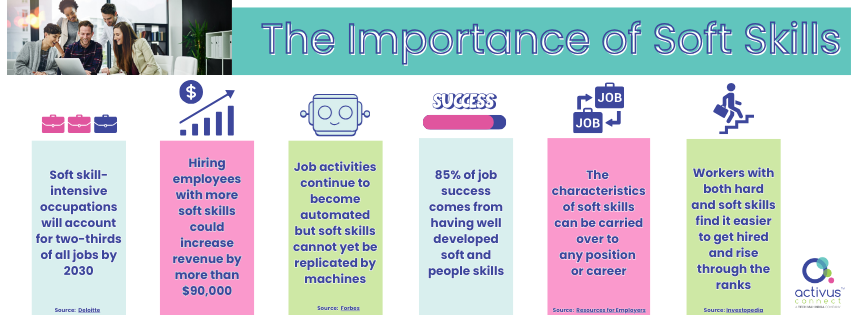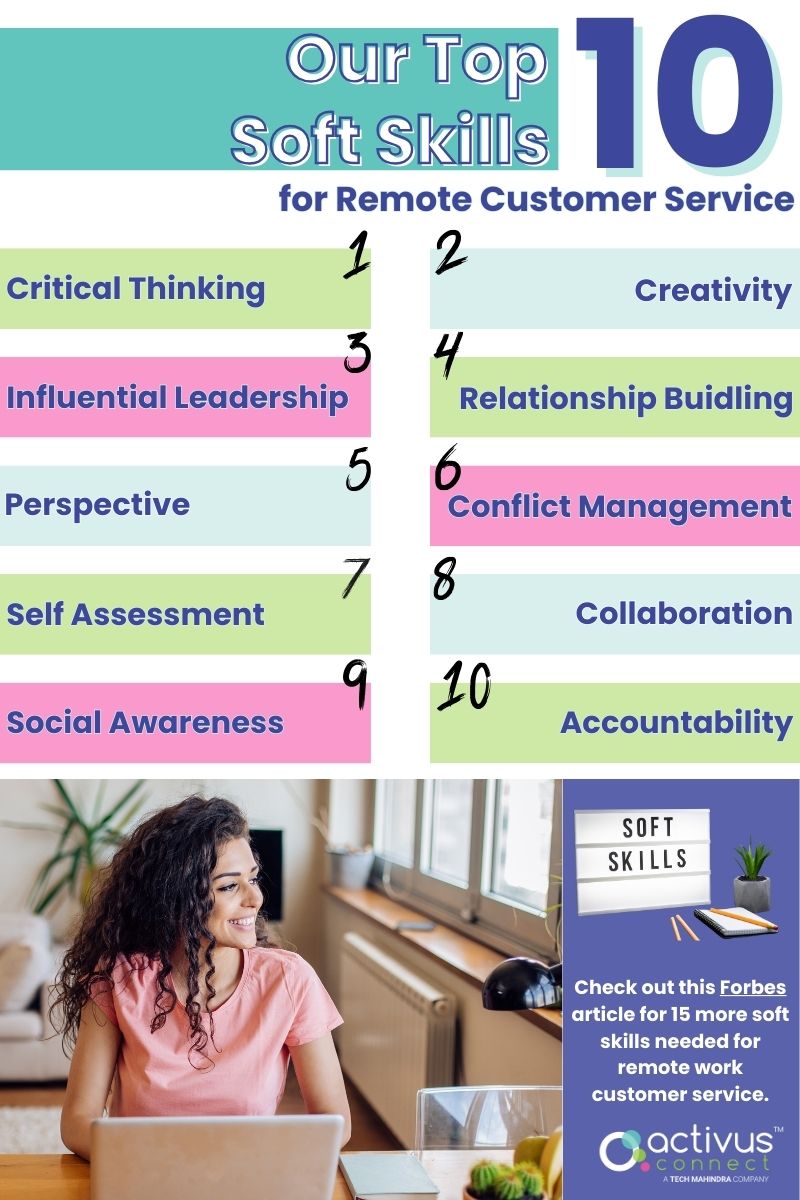
In today’s digital world, customer service has taken a bold leap into the remote realm, where face-to-face interactions are replaced by chat windows and phone calls. But even without physical presence, one thing remains constant: the power of soft skills.
The ability to communicate clearly, build trust, and solve problems with empathy is more crucial than ever. In remote customer service, these often-overlooked skills can make or break a customer’s experience.
Let’s dive into why mastering soft skills is the key to thriving in this new digital age of customer service.
Understanding Soft Skills
Soft skills are the unsung heroes of success – they may not be listed in a job description but they’re the secret sauce behind every strong professional. Whether it’s the ability to communicate with clarity, solve problems under pressure, or navigate tricky conversations with empathy, soft skills are what turn a good interaction into a great one.
According to Forbes, they can also be known as “people skills” or “interpersonal skills”. Essentially, soft skills are what make us not just better employees, but better humans.
While soft skills are more often seen as personality or behavioral traits that can’t be taught in a textbook, hard skills are often mastered through education and specific training.
In the past, employers used to hire new people based only on their hard skills necessary for career employment from an educational background or work experience and often rated their success at work solely on the technical ability of completing tasks.
This trend has changed in recent years, in part due to more businesses transitioning into a hybrid or remote work environment. The importance of hard skills and soft skills are now represented more equally.
The Importance of Soft Skills in Remote Customer Service
In remote customer service, soft skills aren’t just important – they’re everything. When face-to-face interaction is off the table, the way you communicate and interact verbally becomes the heart of your customer’s experience.
Without the luxury of reading body language, remote customer service employees must rely heavily on their soft skills to build trust, ease frustration, and deliver solutions.
When it comes to handling diverse customer needs and issues, it requires more than just knowledge of a product or service, it demands a deep understanding of people. Being able to adapt your communication style, actively listen, and show genuine empathy can ensure every customer feels heard, respected, and valued.
It’s these human touches that turn a routine support call into a memorable experience, making soft skills the true driving force behind success in any remote customer service role.

Key Soft Skills for Remote Customer Service Agents
Effective Communication
- Customers want straightforward answers without confusion or unnecessary details. Use simple language and get to the point to ensure your message is easily understood.
- Active listening is key to understanding and resolving customer issues quickly and effectively. Give full attention, summarize, ask open-ended questions, and avoid interrupting are great techniques that allow your customer to feel heard.
Empathy
- Emotions often drive how customers perceive their experiences, so recognizing and responding to a customer’s emotions can greatly impact the outcome of an interaction.
- Tailor your communication to the customer’s emotional state, whether they need a fast solution or just need to be heard. Offer resolutions in a way that shows you’re not just solving the problem but also validating their feelings.
Problem-Solving
- Sometimes the best answers aren’t found in a manual, they come from thinking outside the box. Think beyond the obvious, use resources wisely, adapt to the situation and be proactive.
- Approach a complex problem with a structured and empathic mindset by staying calm, breaking down the problem, asking questions and following through to turn difficult situations into a positive experience for your customer.
Adaptability
- It’s impossible to avoid unexpected challenges. Being flexible and adaptable allows you to bounce back from setbacks, read situations clearly and adjust your approach based on the situation’s needs.
- Customer expectations evolve, so continuing to learn and improve is important. Stay updated on best practices, seek feedback, learn from mistakes, reflect and make adjustments regularly to maintain your efficiency and customer satisfaction.
Below is a list of an additional 10 soft skills needed for remote customer service:

Developing Soft Skills in Remote Customer Service Teams
If you want to deliver top-tier support, it all starts with the right training. Implementing interactive workshops and training for employees can significantly enhance business efficiency.
These programs help develop critical skills such as effective communication, emotional intelligence, leadership, and efficient problem-solving. These skills not only contribute to personal development, but also have a direct impact on the business’s bottom line.
While hard skills can be learned by studying from a book, soft skills need a combination of environment and other people to be mastered. Role-playing exercises bring real-world scenarios to life, allowing agents to practice handling difficult situations with confidence.
Receiving regular feedback and performance reviews can provide invaluable insights to help team members continuously improve and adapt.
By investing in soft skill development, you empower your remote team to deliver exceptional customer experiences, even from miles away.
Technology and Tools to Enhance Soft Skills
Communication platforms like Microsoft Teams, Zoom, Google Meet, and many others play a vital role in enhancing soft skills within remote customer service teams. They allow teams to engage more and strengthen the ability to provide excellent remote customer service.
Customer Relationship Management (CRM) systems are another tool that can be used to enhance customer relationships. These systems are designed to manage interactions and maintain strong, consistent relationships with customers while boosting efficiency and soft skills like communication and empathy.
A more contemporary tool that can be utilized to support, not replace, the essential soft skills is AI and chatbots.
Chatbots handle routine queries, freeing up human agents for more complex interactions. AI analyzes customer sentiment and past behavior to allow service reps to tailor their communication, showing understanding with greater precision.
Together, AI and chatbots enhance the human touch by giving agents the tools and insights to deliver faster, more personalized and emotionally intelligent service.
E-learning and online resources are a way to refine their soft skills through interactive courses, videos, and self-paced learning modules. Whether it’s role-playing scenarios or instant feedback quizzes, online resources give the employee the extra push to stay ahead in delivering better customer service.
All of these tools are game-changers when it comes to building soft skills in today’s fast-paced, remote work environment. Accessible anytime, anywhere, these platforms allow teams to sharpen their skills to provide exceptional customer experiences.
Challenges and Solutions
Remote work may sound like a breeze to some, but it definitely comes with its own set of challenges.
Missing the energy of face-to-face interactions, managing stress from isolation and balancing workloads without the structure of an office are just a few of the struggles remote workers may face. Overcoming these hurdles is key to thriving in a digital workspace.
Incorporating consistent virtual communication through video calls and chats helps recreate that human connection that many of us crave, while time management and self-care are critical when handling stress.
With the right strategies, you can overcome these remote work challenges and watch them turn into opportunities for growth, balance, and delivering consistent quality service.
Conclusion
In the end, with the fast-evolving world of remote customer service, soft skills are the secret weapon that separates good support from great experiences.
From clear communication and empathy to creative problem-solving, these skills are what make customers feel valued, understood, and satisfied – no matter the distance.
As more businesses shift to remote models, investing in the development of soft skills is no longer a luxury, but it is a necessity for staying competitive.
Now’s the time for organizations to prioritize soft skill training and for customer service agents to sharpen their abilities.
Ready to take your customer service to the next level? Start building a team that excels on the human side of support because that’s what customers remember most!